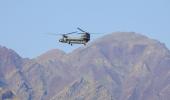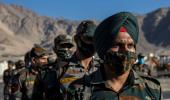The Indian and Chinese armies on Friday held another round of Corps Commander-level talks with an aim to chart a roadmap for disengagement of troops from all the flash points in eastern Ladakh, government sources said.

The eighth round of high-level military talks began at around 9:30 am in Chushul on the Indian side of the Line of Actual Control in eastern Ladakh, they said.
In the last few days, the top military brass of India held a series of meetings where the overall situation in eastern Ladakh was reviewed and it was decided to press for comprehensive disengagement of the troops in talks with China.
The seventh round of Corps Commander-level talks had taken place on October 12 during which China was pressing for withdrawal of Indian troops from a number of strategic heights around the Southern bank of Pangong lake.
However, India maintained that the disengagement process has to start simultaneously in all the friction points.
Nearly 50,000 Indian Army troops are currently deployed in a high state of combat readiness in various mountainous locations in eastern Ladakh in sub-zero conditions as multiple rounds of talks between the two sides have not yielded concrete outcome to resolve the row.
China has also deployed an equal number of troops, according to officials.
The standoff between the two sides erupted in early May.
Last week, External Affairs Minister S Jaishankar said the ties between India and China have come under "severe stress" and that the agreements inked by both sides on management of the border must be respected "scrupulously" in their "entirety" to restore normalcy in relations.
The Indian delegation at the eighth round of military talks is being led by Lt Gen P G K Menon, the newly-appointed Commander of the Leh-based 14 Corps.
At the seventh round of talks, both sides agreed to maintain dialogue and communication through military and diplomatic channels to arrive at a mutually acceptable solution for disengagement "as early as possible".
India has all along been maintaining that the onus is on China to carry forward the process of disengagement and de-escalation at the friction points in the mountainous region.
Following the sixth round of military talks, the two sides announced a slew of decisions including not to send more troops to the frontline, refrain from unilaterally changing the situation on the ground and avoid taking any actions that may further complicate matters.
The sixth round was held with a specific agenda of exploring ways to implement a five-point agreement reached between Jaishankar and his Chinese counterpart Wang Yi at a meeting in Moscow on September 10 on the sidelines of a Shanghai Cooperation Organisation conclave.
The pact included measures like quick disengagement of troops, avoiding action that could escalate tensions, adherence to all agreements and protocols on border management and steps to restore peace along the Line of Actual Control.











 © 2025
© 2025